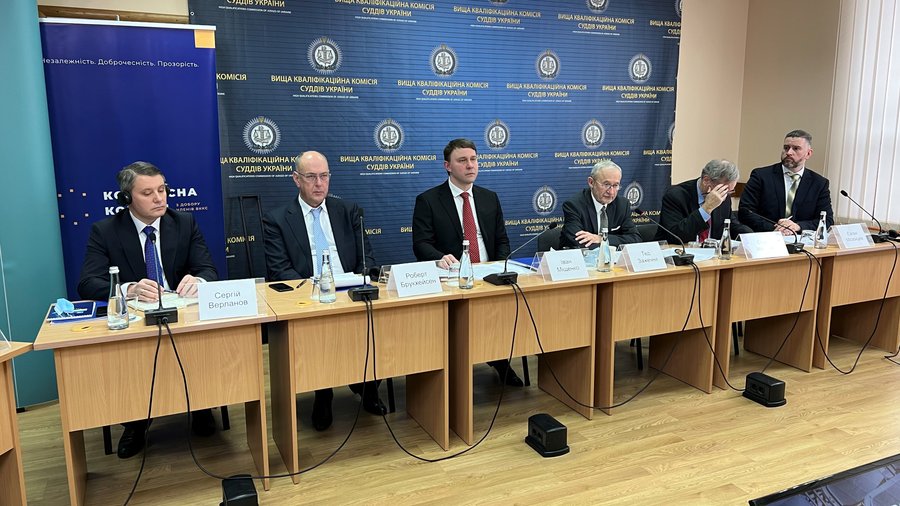In a significant step forward for judicial reform, all the necessary members of Ukraine's renewed High Qualification Commission of Judges (HQCJ) were approved on 1 June.
This key body of judicial self-government had 16 members approved by the High Council of Justice, another judicial self-government body, in a step crucial for the further improvement of Ukraine's judiciary. The formation of the HQCJ was one of Ukraine's outstanding tasks to move forward with EU membership.
The High Council of Justice, which selected the candidates online in unprecedented transparency, noted that the HQCJ's formation will now allow selecting judges for over 2,500 vacant positions and certifying another 2,000.
The HQCJ's work was frozen since 2019, when the Ukrainian parliament dismissed this key judicial body after President Zelenskyy won the presidential election. Judge selection in the judicial system was suspended, resulting in a shortage of 2,500 judges. Many judges cannot administer justice due to the expiration of their five-year term of office.
Mykhailo Zhernakov of the DEJURE Foundation, a key NGO advocating for judicial reform in Ukraine, greeted the appointment of 16 members for the HQCJ, noting that civil society overseeing the reform had reservations about the integrity of only two of them.
"Overall, this is a good list and a clear victory," Zhernakov wrote.
However, he added that, apart from the two judges who civil society found to have made questionable decisions (such as judge Luhansky, known for acquitting 54 drunk drivers), the final list does not include any representatives from professional non-governmental organizations known to champion change. Nor did the High Council of Justice appoint Andriy Kozlov, the only candidate with previous experience as a member of the High Qualification Commission of Judges who has demonstrated his ability to perform this role independently, Zhernakov said.
"This, of course, will hurt the HQCJ's institutional capacity, the progressiveness of its approaches, and, in general, its ability to appoint the best judges to the 2,500 positions. And I can't shrug off the impression that this was on purpose," he wrote.
This result illustrates the "approaches and priorities" of the High Council of Justice, Zhernakov says: the most independent candidates were weeded out, not the obviously inappropriate ones.
According to Zhernakov, this confirms Ukrainian civil society's fears that judges from within the system cannot clear out themselves and will fight for the status quo at all costs.
"'Judicial self-government' does not work and should be limited as much as possible, at least until the quality of the judiciary rises to meet the requirements of society," Zhernakov said, confirming the observation of another judicial reform advocate, Halyna Chyzhyk, that the western judicial model does not work in post-Soviet states.
What does work, Zhernakov says, is "the involvement of independent international experts, who, together with progressive Ukrainian members of the Competition Commission, shortlisted a very strong list" for the HCJ.
Another thing that could improve the situation is the involvement of civil society, which is why Zhernakov calls to form a Public Integrity Council to help the HQCJ evaluate judges during competitions and exercise public control over the process.Commission for the Selection of Candidates to the HQCJ, Photo: Iryna Sayevych / Suspilne
In July 2021, the necessary legislation for judicial reform was adopted in a step hailed by judicial reform experts, and in September, a new competition for the HQCJ was launched. The commission consisted of Ukrainian and international judges and experts, with several organizational meetings held before the full-scale invasion interrupted the process. The selection process was put on hold for six months due to Russia's invasion in February 2022, but the commission resumed its work in the summer of that year.
“Historical event” as Ukraine finally adopts all legislation for judicial reform
Third post-Euromaidan attempt at judicial reform
The formation of the renewed HQCJ, responsible for selecting and certifying judges, and High Council of Justice (HCJ), which makes final decisions on the appointment, punishment, or dismissal of judges, are seen as steps that can relaunch Ukraine's judicial reform.
Highly demanded by Ukrainian society after the Euromaidan revolution of 2014, the first attempt to reform Ukraine's judiciary was made during the presidency of post-Euromaidan President Petro Poroshenko, including the qualification assessment of judges, involving civil society, and creating a new Supreme Court. However, the implementation responsibility was placed on unreformed judicial self-governing bodies, which led to preserving the old corrupted judicial system. They kept appointing tainted judges to key positions, ignoring the voice of civil society represented by a Public Integrity Council that assessed candidates but had no veto power over their appointment.
Learning from this, civil society advocated for changes within the High Council of Justice (HCJ) and the High Qualification Commission of Judges (HQCJ), proposing international experts' involvement to ensure genuine reform. This approach was successful in forming the High Anti-Corruption Court, leading to high-level corrupt officials being prosecuted for the first time. Despite this, the judicial system's core resisted the participation of international experts.
During Volodymyr Zelenskyy's first reform attempt, the HQCJ was disbanded in 2019, and the HCJ obstructed international experts from participating, striving to maintain control over Ukraine's judiciary.
In the next attempt at reform, civil society advocated the laws needed to relaunch the HQCJ and HCJ (adopted in 2021), which included the creation of an Ethical Council, the purpose of which was to assess the integrity of judges and weed out dishonest members of the judicial system.
Indicating its effectiveness, on 22 February 2022, two days before Russia invaded, the Ethical Council started evaluating the HCJ, causing 10 of the 15 current members of HCJ to resign at their own request prematurely. After a pause in the initial months of Russia's invasion, on May 27, the Ethics Council resumed conducting interviews for the High Council of Justice. And on July 23, President Volodymyr Zelenskyy formed a commission to select candidates for the High Council of Justice and ordered holding a competition. Two of the newly-appointed HCJ members were hailed by civil society.

